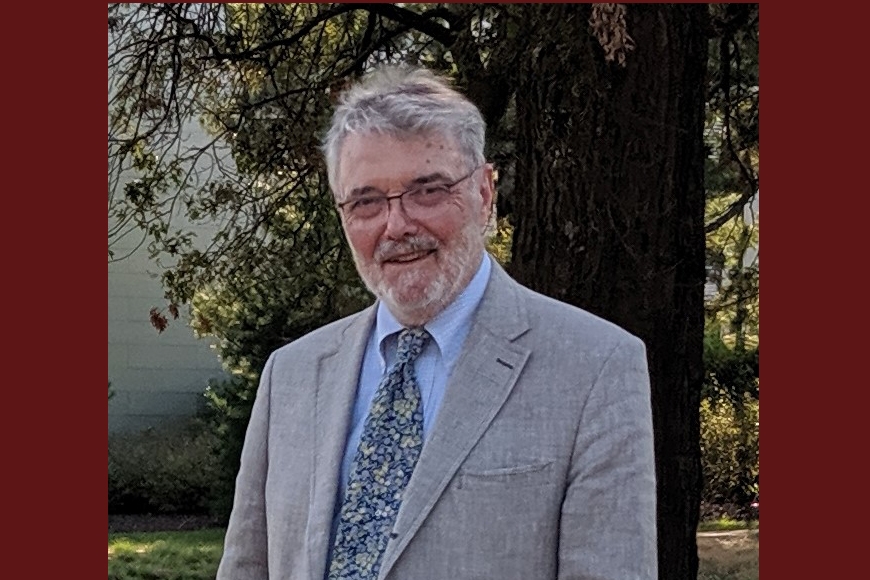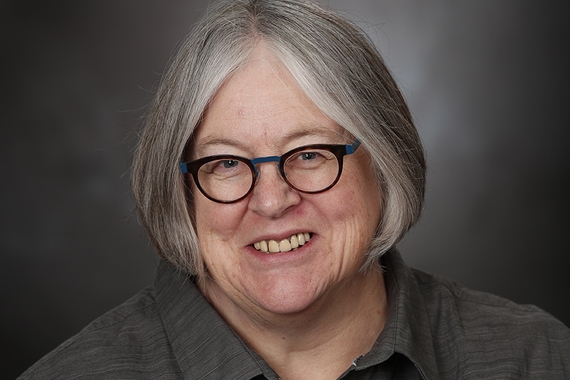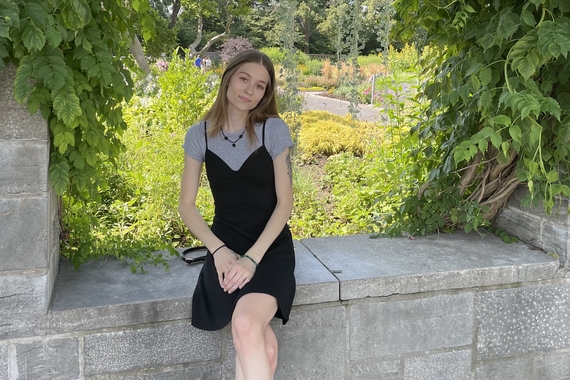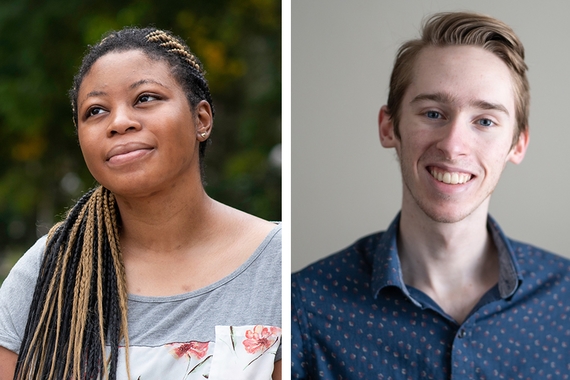Michael Hancher: 50 Years of Service at the U
It’s been half a century since Professor Michael Hancher first addressed a classroom of undergraduates at the University. “I am amazed too,” he says with a wry undertone, in a recent interview. “It’s probably time.” Time to retire, that is, as Hancher will do after spring semester 2022. A scholar of book history, digital humanities, lexicography, and Victorian studies, Hancher created and taught popular English classes such as “Alphabet to Internet: History of Writing Technologies” and “The Image on the Page.” He is the author of The Tenniel Illustrations to the "Alice" Books (second edition; Ohio State University Press, 2019) and numerous articles and book chapters.
While at the U, Professor Hancher discovered an interest in and facility with administration. He has served as College of Liberal Arts Associate Dean for Faculty and Research (1996-2000), Chair of English (2003-2006), Director of Graduate Studies for English (1983-1988), and member of the University of Minnesota Alumni Association National Board of Directors (2012-2013), among other roles. In addition, he is a past president of the Dictionary Society of North America. “In each of these cases I benefited from collaborating with a group of impressive colleagues,” he says. “None of these jobs can succeed single-handedly, and I was lucky to have help on all sides.”
For his dedication to excellence in University operations, Hancher was honored in 2014 with the University of Minnesota President's Award for Outstanding Service. The College of Liberal Arts (CLA) also named Professor Hancher a Scholar of the College (1990-1993). He received a National Endowment for the Humanities Fellowship as well as grants-in-aid, sabbatical leave supplements, and Imagine Fund awards from the University to support his scholarship—which he plans to continue, as he explains below.
Since you joined the English faculty in 1972, have you noticed changes in the student body that seem significant?
A huge change is the prolonged (though necessary) imposition on the classroom of social distancing, whether by Zoom or by mask—which constrains the classroom dynamic in significant ways. It's true that the eyes do not convey all the expression that the face does. So [with masking] you lose that immediacy: We're used to it; we rely on it. Can we work around it? Yes. Is it the same? No, it's not as good. Then there's a matter of voice projection when students are masked. Zoom, you can see all that, you can hear all that. But then it has its own form of anomie. Students are coping. But this is not what they want to be doing in class, and it's been like that now for two years.
How has teaching changed since you first became a professor?
When I started at the U there was no internet, let alone any classroom management software. The entire archive of books published before 1923, now 1924, is suddenly handy for anybody in a way that it wasn't before. A lot of authors who you might have taught only in a heavy anthology have their original editions up there for students to look at. There's a lot of distancing going on in the internet, and the digital book is not the same as the real book. But you can actually see more of what the book looked like than you can in the Norton anthology. [Professor Hancher weighs in more on the book versus the digital book in "Duplicate Books, Facsimiles, and Weeds: A Bibliography with Excerpts, for Scholars and Librarians" (2021)].
And you can be selective. You can make your own readings more immediately to the purpose. The people who put out the learning management systems have a lot of features that they are happy to provide, and they're a little disappointed when people only use it to store stuff for students to access. But I would not underestimate the power of storing stuff for students to access. That is a convenience we didn't use to have. In addition, one of the things that you can now do online, and which you could only do through elaborate workarounds before, is have students share commentary on what they’re reading.
What will you miss about teaching?
CLA's capstone seminar requirement makes it possible for students and a professor to work together to accomplish something more substantial than the usual relatively brief course paper. One thing that I'll miss is the gradual revision of each student's project. These papers start out with the gleam of an idea and an abstract, maybe a title. And these actually do develop. It doesn't happen every time, but often they accomplish something really instructive—to me—and impressive. In a regular class, you're going on to something else; you don’t quite get that arc. So it's a good model.
What have you enjoyed about focusing on book history, digital humanities, and Victorian studies as your specialties?
These three fields do overlap, helpfully. The "digital turn" puts the last five centuries of print into high relief, and the Victorians brought the products of steam-powered printing presses to a mass market that anticipates our own. The Victorians would have loved the internet. They loved the telegraph: instantaneous information, making possible, among other things, railroads. We are frustrated by a three-second lag when something doesn't happen. Well, that's moving in the world that they opened up.
Any plans around future research and writing projects?
Right now, I'm seeing two book chapters through the press. One will be “Illustrating Meaning: Pictures in Dictionaries.” The book, The Cambridge Handbook of the Dictionary, is scheduled for early next year. Another chapter is in a book called Printing Things, about the use of objects to print text and images, especially images. This piece is a co-authored piece, the second that I’ve written in my entire career. I wrote it with the help of staff at CLA LATIS, who did some very helpful work with fancy machinery. We're looking at some wood blocks from the Thomas Bewick workshop that we happen to own at the Bell Museum. The retired curator of the Bell is another author. The prose is mostly mine, except for the technical parts, which are done by LATIS staff.
Also, having published a couple of articles on the subject, I'm further examining T. B. Macaulay's influential advocacy of English and English studies. That's what's preoccupying me right now. I’m beginning to think of framing it as a book. The English department we're in is ultimately a product of agency such as Macaulay’s on behalf of the modern languages, as opposed to the classical languages. By “modern,” I mean Shakespeare, Chaucer. Macaulay is notorious for his intervention in India, where he argued for higher education being based in English and not in the classical languages of India. When he got back to England, he was very influential in coding English as equivalent to the classics in the examinations system for access to government jobs. That competition model, which he gets ultimately from Adam Smith and other capitalists, was renewed in the United States by James Bryant Conant in the 20th century, when he invented the College Board and the Scholastic Aptitude Test. Of course, the end of the story is that precisely that kind of testing which was a reform for Macaulay, and a reform for Conant, is under cross-examination now, in the name of reform.
What is the most intriguing work you've read this year?
A real page-turner is "Spec Acts: Reading Form in Recurrent Neural Networks," by Matthew Kirschenbaum (ELH 88, Summer 2021). He’s a very good writer. I found myself reading this on my cell phone. He argues that the ability of neural network computing to learn and copy the habits of anything, including writing, is getting so sophisticated as to be able to generate texts in a way that completely calls into question traditional motions of form and agency. He has a great creative writer example, of a guy who drove around the country with a video camera videoing stuff and then feeding it in. The stew is getting complicated, is the point of the essay, in a way that should make us think about our assumptions about how we read anything. I'm not sure that I agree with the argument, but it would take time and subtlety to establish why not.
Are there non-academic interests you look forward to exploring?
Over the years Linda and I have collected quite a few books about Minnesota's natural and cultural history (University Minnesota Press books are really good for this kind of thing.) We hope to put them to good use on the road. We've gone most directions, so I’m familiar with where I am. Surprisingly, a lot of students have not gone in most directions. It’s odd. Places like Bemidji or Pipestone are like a foreign country to people who were born here! Maybe I find it so interesting because I was not born here. The state has a volcanic character on the north, and it was shaped determinedly by glaciers on the south. My brother-in-law is a geologist, and we want him to come out and spend some time here. The Gunflint trail has two billion years of geology along it, available for looking at. You drive by in a hurry, you don't see it.
The Mississippi River at the campus is something to look at—rather not the river, but the sides. Walking from the West Bank to the East Bank, you get a very good view of the stratigraphy. Right below the Weisman, you can see it very clearly. The U is just a little thin thing on top.



